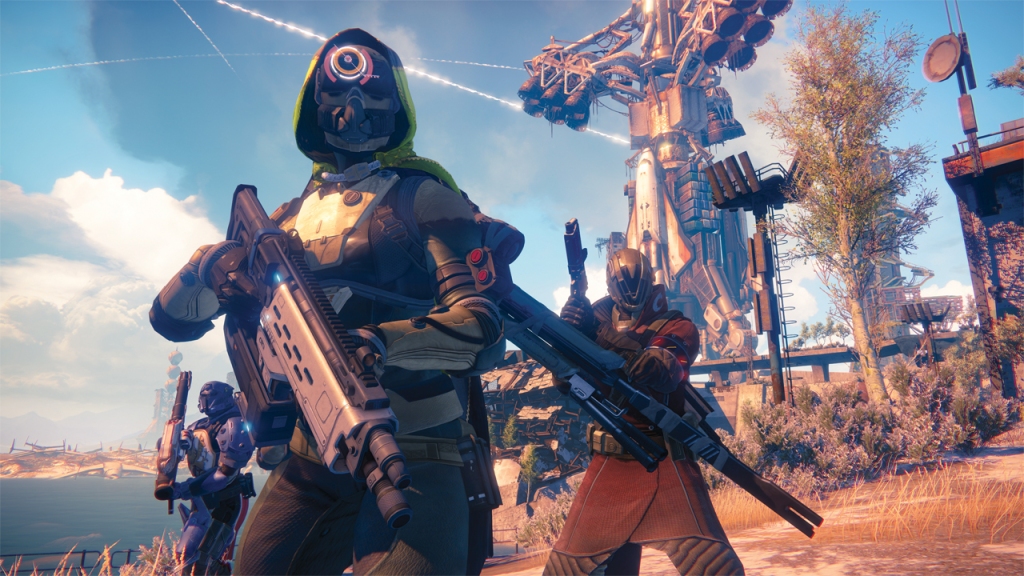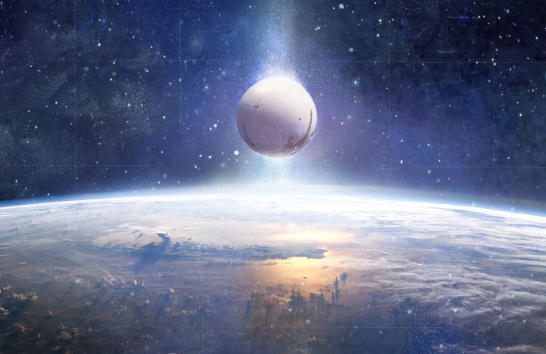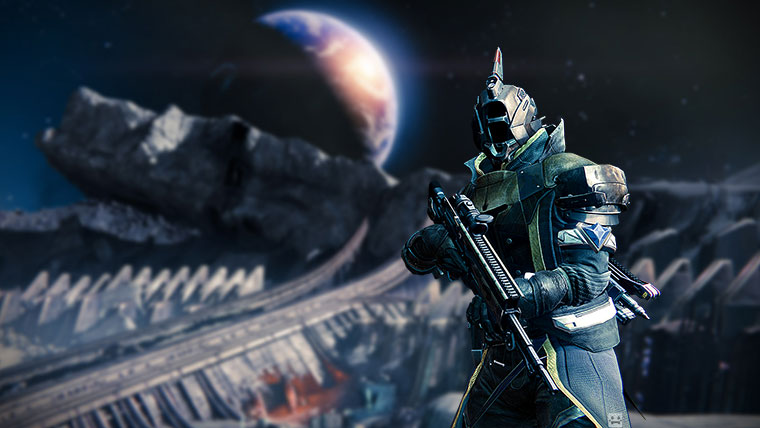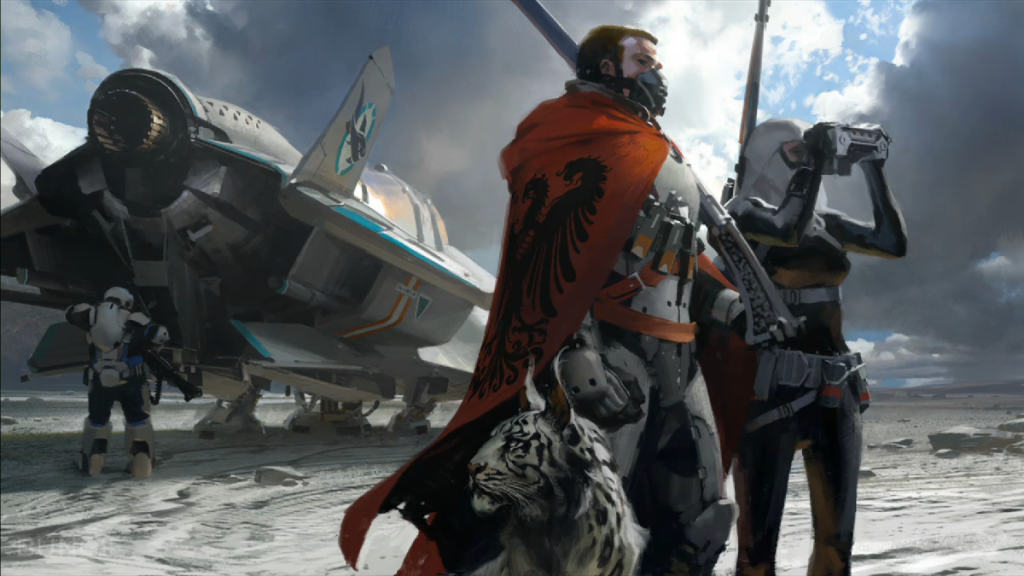Oh, science fiction. It’s my favorite genre, and I’m always intrigued by a new sci-fi IP. That’s why I’ve been so excited about Bungie’s new game Destiny for a very long time now. This past weekend, Stephen Rhodes was kind enough to hook me up with an extra beta code so I could give it a try, which totally made my day!

So far, playing Destiny feels a lot like living in a crazy dystopian Star Wars-type of universe where I get to be a robot. It’s kind of perfect, but it brings to mind something I’ve talked about here on Robo♥beat before: the science fantasy genre, for which I am also a sucker.
As much as I love science fiction — pure, hard sci-fi — I often find it to be either too cold/scientific or a terrifying post-apocalyptic wreck. Neither of those feels very inviting to me. I prefer the warmth of worlds like Mass Effect, Borderlands, and Firefly. Sometimes they’re sleek, other times they’re dirty or quirky, but what they have in common is a big focus on rich lore and the “people” side of what makes the fictional universe ticks. That’s what I care about.
So far, Destiny has very little character development — yet it still manages to feel inviting. There’s a warmth to the world that goes beyond the MMO-style play. If I had to compare it to just one other world, I would say Destiny reminds me most of Star Wars, and to me, Star Wars isn’t pure science fiction — it’s science fantasy. I believe Destiny is, too, and that’s a big part of what makes its worldbuilding feel so different than that of other sci-fi shooters.
The Traveler

First off, there’s a massive sphere in the sky called the Traveler. At first glance, it looks like a small planet, but it’s actually the size of a city. Its appearance over Mars sparked a Golden Age for humanity, as the Traveler was able to terraform planets like Mercury, Venus, and Mars. This allowed humanity to expand across the solar system for the first time.
The creators of Destiny at Bungie call the Traveler an “ancient artifact.” I think they chose the right name for it. Calling it “the Traveler” feels comfortable, albeit mysterious and powerful and possibly very old. This is not (just) a cold piece of technology or an alien sphere from a distant solar system — this is something people welcome.
But how does the Traveler work? If we had some explanation for how it terraforms planets, we would have science fiction on ours hands. But the Traveler’s technology is a mystery. Its origins are a mystery, too. Nobody knows its reason for existing or for helping humans colonize the solar system.
Interestingly, Bungie’s developers held a panel at the 2013 Game Developers Conference to talk about Destiny’s worldbuilding, and in it, they said the Traveler is supposed to be mysterious. They want players to use their imaginations to fill in the blanks about what the sphere is, and I believe that’s true for the people within this fictional world, too. The mystery of the Traveler’s origins and motivations has led people in this world to concoct all kinds of theories. Maybe the Traveler is an ancient machine, a sentient alien, or a god — all things the people in the world of Destiny imagine. This type of speculation grants the Traveler an arcane quality.
Space Wizards
The Guardians make things even more interesting.

Apparently, The Traveler has an enemy known as the Darkness, which has destroyed everything except one single city on Earth. The Traveler sacrificed itself to protect this city, which is now humanity’s last safe haven. Yet the Traveler still sits in the sky above the city, granting energy to the Guardians who protect it. The Guardians use this energy to unleash special powers. (It reminds me of the “magic” of the Force in Star Wars.) The character class that can do this is known as the Warlock class — and if you set aside the Traveler for a minute, what you really have here is a space wizard.
Sure, Mass Effect has its biotic powers, but these are explained in a scientific way. Whether or not that explanation is plausible is unimportant here — at least you have the attempt at science. In Destiny, you have something much more enigmatic, because the powers are not immediately justified by reason.
Maybe the game will unveil how the technology works that allows Warlocks to brandish their unlikely abilities. In the meantime, all of this feels like magic to me. That’s part of the fun of this world.
The Inspiration Behind Destiny
In their GDC talk, Bungie’s developers talked about how they built the world of Destiny to feel “hopeful and inviting,” so people would want to spend time there. That hits the mark for me exactly. It’s why I’m personally not a big fan of zombies or post-apocalyptic worlds that are too dark. I know those can be fascinating, but I prefer them in TV shows and movies more than video games — because frankly, I don’t want to spend a lot of time in them.
Mystery and adventure were also important pillars for Destiny’s developers. And after working on Halo, one of their first inspirations was something totally different: fantasy. They liked the idea of monsters and heroes, ancient ruins, rich history, and an emphasis on exploration. But they couldn’t shake their love of science fiction, either — which is why they ended up blending the two genres to create something unique.
That’s why Destiny has heroes who wear cloaks and fly spaceships. You have tombs filled with loot, but you also have advanced technology and weaponry. The Awoken race is partly inspired by vampires and elves, while the Exo race is a robotic species.
As the Bungie team conceptualized, this was the image that hit the mark for them:

Another thing that gives Destiny the warmth of fantasy is the personal spaceship. Very early on in the game, you get access to a personal jumpship that you can upgrade and fly around as you explore. This gives players incredible freedom. Bungie’s developers say these personal spaceships are the equivalent of horses in fantasy.

The Bungie devs talk a lot about how arbitrary genre rules are, and that art can lead the way to a more unique and flexible worldbuilding. An example is souls visibly leaving the bodies of the Fallen when they’re killed — something that cropped up in the artwork for Destiny. Although the devs toyed with the idea of explaining this in a scientific way, in the end, they left the explanation as souls being ripped out of bodies. It might be mystical or magical or unscientific, but it feels right in this world.
That’s the key to good science fantasy, really. You don’t have to explain everything from a technological or evolutionary standpoint, but it has to feel like it belongs. For me, Destiny’s world feels very true and inviting, even if much of it remains a mystery.
— Ashley


Great post Ashley!
Destiny is by far my most anticipated game of the year. Loved the alpha, been loving the beta even more. I even like the PVP, which is something I usually don’t care for.
Can’t wait for the full release! If you’re playing on PS4, add me: PatriotPaine
Thanks! It’s one of my most anticipated games this year too. I missed the alpha, so I’m really excited to finally be playing it!
Can’t think why I wasn’t interested in this game before now (probably some mild concussion I sustained while falling from the hype of Watch Dogs). But despite not participating in the Beta (due to the likelihood that my internet would implode trying to download it) I may have to pre-order this.
Yeah, Destiny’s worldbuilding is excellent to me… but really, it’s just a fun shooter that feels very nontraditional. I haven’t gotten around to Watch Dogs. What were your thoughts about that one?
Though the hacking had potential, its incredibly contrived and monotonous. The environments are hollow, as our the inhabitants of the city. Vehicles steer as though the wheels have been affixed and secured by a hamsters teeth and the graphics seem as though they’ve been textured with a disparate mix of greys. But my biggest gripe is the lead “character” (and I mean character in the loosest sense of the word). Not to shamelessly self promote my own blog, but I covered my disdain for Aidan a while back, which pretty much vocalises my disappointment in him fairly accurately.
I’m making this game sound way worse than it is purely because I was really looking forward to it. In short; its not bad as such, just disappointing.